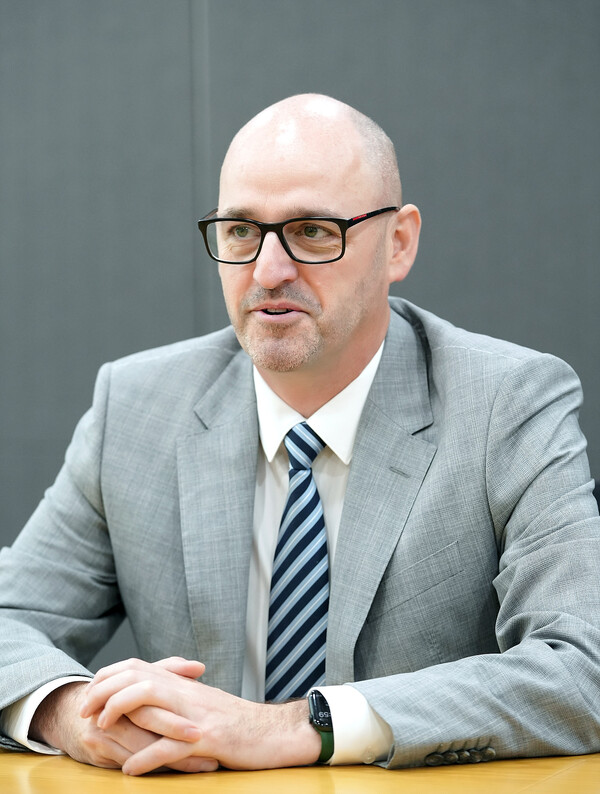In an era marked by groundbreaking advancements in genomics sequencing and precision medicine, Illumina Intercontinental is playing a pivotal role. With its cutting-edge next-generation sequencing (NGS) technologies and global presence, Illumina continues to revolutionize the field of genomics.

At the helm of Illumina's operations in Korea is Rob McBride, who serves as General Manager for Illunmia Intercontinental also responsible for Australia, New Zealand, and Singapore.
Korea Biomedical Review recently sat down with McBride to talk about the transformative power of genomics, the challenges faced by the industry, and Illumina's role in driving the future of healthcare in Korea.
Korea, a key market for Illumina
McBride stressed that Korea is a key market for Illumina.
Illumina established an office in Korea about six years ago as the nation was one of the global leaders in taking on new technologies, he said.
Macrogen, a Korean genomic analysis company, was Illumina’s first site in the Asia Pacific to install NovaSeq X, its newest NGS device.
NovaSeq X is a new production-scale sequencer that will drastically shorten the sequencing time and generate more than 20,000 whole genomes per year, enabling more sustainable sequencing.
The device can also decrease the cost of sequencing drastically.
The GM went on to say that considering that Illumina has received about 200 orders for NovaSeq X globally and the demand is outstripping its manufacturing capabilities at the moment, the installation of NovaSeq X at Macrogen demonstrates both the value of Macrogen and the importance of Korea.
"It's an exciting time for us in Korea, considering it's a regulated market," McBride said. "We've had quite a lot of success already with Miseq and NextSeq DX platforms."
Korea has the biggest installation of Illumina's DX platforms globally, he added.
Despite being a regulated market, McBride praised Korea's fast access to diagnostic platforms. He attributed this to the country's ability to regulate a system rather than the entire process, as is done in Japan.
"I think the challenge that we have to keep remembering from a government perspective is that it's only been 20 years since genomic analysis entered the healthcare market, and it's developing extremely fast," he said. "It is very challenging for a government to keep in pace with such fast progress."
He said the industry needs to be more realistic and accept that the government is moving as fast as it can.
AI to be a crucial part of Illumina's genomic sequencing biz
When asked how Illumina is adapting to the recent advancement of artificial intelligence (AI) in the healthcare industry, McBride explained that the company has fully embraced AI and machine learning and is already integrated into its system.
"We have products that are already out there that use AI," the GM said. "Products that use AI speed time to results, and this is important for us as it takes a whole genome assessment down to a matter of minutes."
One of the biggest costs will be the interpretation and analysis of the genomic data, and AI will continue to be an important part of the genomic analysis business moving forward, he added.
Illumina fulfilling its social duties through CSR
McBride noted that not all of Illumina's business in Korea is focused on making a profit.
"We conduct various corporate social responsibility (CSR) activities with certain stakeholders," he said.
For example, Illumina has partnered with JUMP, a nonprofit educational social venture company, and Dong-A Science to provide science, technology, engineering, and math (STEM) education in Korea, with plans to expand the program to the Asia Pacific region.
"Illumina will engage 280 underserved students in a series of STEM learning sessions throughout the year in 2023," he said. "These elementary and middle school students will participate in eight sessions of both theory and hands-on learning across four science topics, wtospark and sustain their interest."
The year-long program kicked off in April in celebration of DNA Day on 25 April, he added.
Beyond championing STEM education in the community, McBride also said that Illumina Korea has been giving back through various initiatives relating to Healthcare and Environmental Sustainability.
"In the past, grants and donations have been given to organizations such as the Korea Childhood Leukemia Foundation, Special Olympics, and Junior Achievement Korea," he said. "Employees have also come together to engage in driving sustainability such as organizing old clothes donation and garage sales to raise funds for OTCAN, a nonprofit organization that reuses old clothes."
Korea's National Project of Bio Big Data is the next big thing for Illumina Korea
McBride said Illumina Korea plans to focus on Korea's National Project of Bio Big Data, which aims to build a database system in which Koreans' health and genetic data.
"Government-led genomic projects are becoming very prevalent globally," he said. "For example, there are projects in Singapore that have been going extremely well, and they're offering opportunities for genomics to be able to be helping in the diagnosis and assessment."
And these projects will help countries like Korea as the country does not have a mixed population like most Western countries.
"As a result, conducting these larger studies allows us to create or identify certain diseases that are more prevalent in Korea,' McBride said. "By analyzing the population, we can determine what's causing them but also what treatments can be provided for them."
The other critical thing is genomics can save costs in the health system, and that can be extremely important for governments, he added.
McBride said the project could help find out what drugs are effective for the Korean population, which will allow the government to be a bit more selective on certain drugs that they reimburse.
Related articles
- Macrogen installs Illumina’s latest production-scale sequencer
- Illumina, Allergan Aesthetics welcome new leadership in Korea
- Invites Genomics, Illumina launch initiative to develop personalized medicine for Koreans
- Illumina celebrates 25th anniversary with release of genomic evolution infographic
- Macrogen breaks ground for ‘Asia’s largest genome big data hub’

